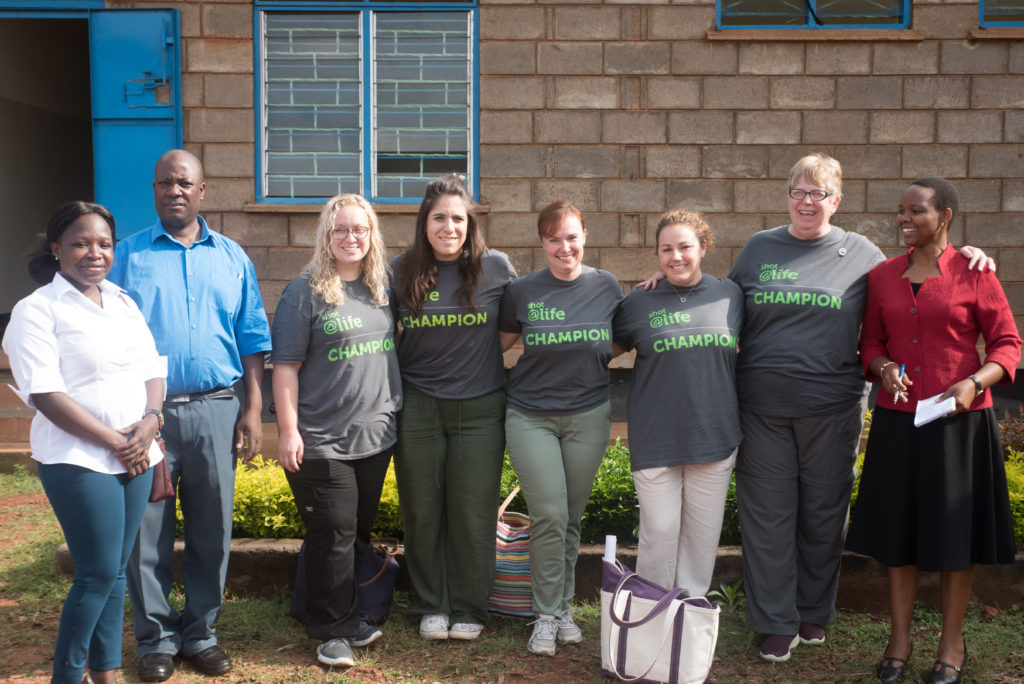
Why are you passionate about Shot@Life’s efforts to expand access to vaccines for children in developing countries around the world?
Fairness and our global responsibilities– I’ve been so fortunate in the U.S, and I think that many Americans (including me) spend more at Starbucks in a week than it costs to vaccinate a child against the four most deadly diseases for those age 5 and under. As citizens of the world, we reap many of the benefits, the least we can do is provide access to the vaccines we take for granted here in the U.S.
I’m also a fan of stopping diseases like polio and measles at the source – the fact that I traveled halfway around the world in less than 24 hours made it apparent that diseases can travel just as easily. If we don’t keep up our efforts to get rid of polio once and for all, then the billions of dollars spent to date are wasted. It wouldn’t take long for polio to reclaim countries where it has been eradicated.
What motivated you to become a Shot@Life champion?
I was most motivated by the opportunity to meet with other champions, to learn about vaccines and the process for deploying vaccines internationally – the best perk, though, has been the opportunity to meet with members of Congress on this issue. Shot@Life taught me how to be an advocate and use the power of my voice to help shape public policy. That’s a truly valuable gift!
Can you please share a few meaningful moments from your recent trip to Uganda and lessons learned that stood out?
Overall Uganda is an incredible country. They are doing the absolute best they can in very difficult circumstances. They have huge challenges to overcome with the economy, infrastructure, health, education and electricity among other areas. They are constantly running as fast as they can to keep up and all it takes is one hiccup to set everything else back. I was especially impressed with the dedication and resolve on the part of health workers in Uganda, and it was interesting to see how many of them were women. One of my takeaway lessons has been that women are often the unrecognized change makers in their communities as the heart of the family.
We also visited a local school, where we asked the kids a series of questions about vaccines. They were far more knowledgeable about vaccines than my children ever were, because we in the U.S often don’t have to be.
How does your professional background translate into your advocacy actions?
I’ve worked with engineers throughout my working life. I usually characterize my role as the “office mother” – I keep track of documentation, run meetings, and nag everyone to get their chores done on time. In some ways, that’s similar to what I’ve done with members of Congress – nag them on occasion (in a nice way, of course) – and make sure they know the importance of Shot@Life both here in the U.S. and abroad. On a person note, I’ve always believed my grandfathers dictum that “you learn something new every day”. The more I learn about the issues surrounding vaccine preventable diseases, the more inspired I am to do something about it!
What do you think is the biggest problem vaccine advocacy faces?
I’m very concerned about the shifting focus of so many citizens and politicians from our global responsibilities to nationalist thinking. I have talked to several people who have the perception that the United States spends as much as 25% of its budget on foreign aid – they’re stunned when I point out that’s it’s less than 1%, and a vanishingly small amount of that goes towards funding global health programs. I’ve also run into vaccine reluctance, usually based on the study which claimed to show a link between autism and vaccines. Unfortunately, once a belief has been established it’s difficult to dislodge it from the national zeitgeist no matter how thoroughly the idea is debunked over and over again.
How can other people get involved with vaccine advocacy and why is it important?
Vaccines don’t know boundaries. They don’t pay attention to a map. It’s how 20 cases turns into 40 then 100 and then millions in a short period of time. The United States has spent billions of dollars to get to the state where we are now and it would be crazy to stop now before the work is done. We are so close to eradicating diseases like polio and measles! We are all in this together and we work better as members of the global community. Outreach through Facebook and social media platforms is a tool I use constantly and a great way to get people involved.
